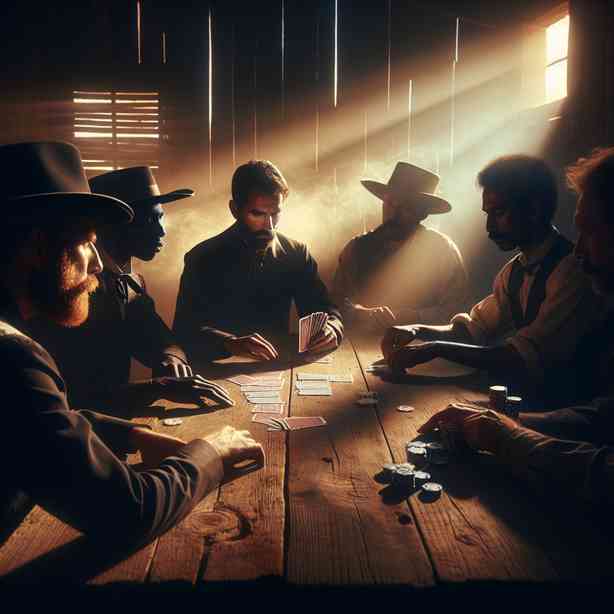
The theme of “The Last Hand Before Sunrise” can be interpreted as a reflection on moments that precede significant transitions in life, embodying the idea of change, reflection, and the inevitability of time. Such moments often serve as a metaphor for the choices we face and the paths we take. As dawn approaches, it signifies the beginning of a new day, filled with potential and hope, while the night symbolizes the uncertainty and challenges we leave behind.
In the context of this title, one might envision a setting where characters are engaged in a card game, a situation that inherently involves strategy, luck, and interpersonal dynamics. Each hand dealt represents not just a chance at winning but also the decisions that shape the outcomes of their lives. The stakes are high, not merely in terms of the game but more poignantly, in terms of the life choices these characters must confront.
Imagine a dimly lit room where the atmosphere is thick with anticipation. The players, each with their own backstory and motivations, gather around the table, exchanging glances filled with determination and apprehension. As the game progresses, conversations ensue that reveal their fears, dreams, and regrets. One might glimpse a character burdened with the weight of missed opportunities, while another might be contemplating a leap of faith into the unknown.
As the last hand is dealt, the tension in the room escalates. Here, we confront the pivotal moment where decisions made not only affect the outcome of the game but also mirror broader life choices—whether to play it safe or to take a risk, to confront the past or to embrace the future. This metaphorical crossroads embodies the essence of “The Last Hand Before Sunrise,” encapsulating the struggle between remaining in the shadows of regret and stepping into the light of new possibilities.
With each card drawn, we witness the unfolding of these characters’ narratives. Each turn brings with it the weight of the past, a gentle nudge towards self-reflection. There’s a poignant depth to their interactions; they navigate wounds that run deeper than mere surface-level grievances. A player might reveal how their choices have driven a wedge between family members, while another may acknowledge the fear of failure that prevents them from pursuing their true passion. This interplay heightens the stakes, both in the game and in their lives, challenging them to grapple not only with the cards but also with their own self-perceptions and aspirations.
As dawn approaches, it becomes clear that this last hand is about transformation. The first light of day brings a clarity that the night obscured. Characters find themselves reflecting on the gravity of their choices. For some, it might be a moment of reckoning that inspires them to take accountability for their past actions. For others, it may invoke a realization that it is time to pursue what truly matters to them, leaving behind unfulfilling pursuits and toxic relationships.
Within this narrative, the concept of community and interpersonal relationships comes to the fore. These characters, bound by their shared experience at the card table, begin to understand the importance of support systems in navigating life’s uncertainties. As they lay their cards down and reveal their hands, they also unveil their vulnerabilities, establishing a foundation for authentic connections that extend beyond the game.
As the sun finally breaks on the horizon, it symbolizes not just the end of a night filled with memories but the dawn of a new chapter for each character. The transition into daylight serves as a powerful reminder that change is a constant in life, and while the past cannot be rewritten, the future is a blank canvas waiting to be painted. The last hand dealt becomes a transformative experience, inciting a cascade of introspection, reconciliation, and renewed hope.
In the wake of this moment, characters may find themselves changed—equipped not only with the lessons learned from their game but also with an enhanced understanding of their place within the world. The journey of navigating through the shadows leads them to embrace the light of possibility, illuminating paths that were previously shrouded in doubt and fear.
To encapsulate the essence of “The Last Hand Before Sunrise,” consider it not merely as a story of a card game but as an allegory for the broader human experience. It resonates with anyone who has faced a pivotal moment, standing at the brink of change, grappling with the past while daring to hope for a brighter future. Each hand of cards deals more than just fate; it invites reflection that can lead to meaningful transformation.
In conclusion, as we move through life, we often find ourselves in ‘last hand’ moments—those instances just before significant change when we must confront our true selves and the choices we have made. These moments, filled with tension and anticipation, offer incredible opportunities for growth and renewal. As sunrise follows the darkest night, so too does clarity and possibility await those willing to brave the unknown and embrace the possibilities that lie ahead. The message is clear: no matter how difficult the night may seem, dawn inevitably arrives, bringing with it the promise of new beginnings and the chance to reshape our destinies. This narrative is a reminder of the resilience of the human spirit and the transformative power of reflection, illuminating our paths as we step confidently into the future.


